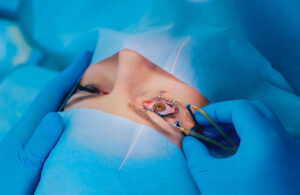
If you’re experiencing cloudy or blurred vision, especially at night, you may have developed a cataract in at least one of your eyes.
- Other potential symptoms include:
- Dimmed, muted colors
- Eyeglass or lens prescriptions require frequent changes
- A yellow tint to everything you see
- Increased sensitivity to light
- Seeing halos around lights
Should you leave your symptoms untreated, these symptoms may grow more intense and cause increasingly significant issues with your eyesight. When that occurs, laser cataract surgery can be a safe and effective option to remove the cataract from your eye and improve your vision.
What is Laser Cataract Surgery?
Your eye contains a lens that sits behind your iris (the colored part of your eye). Like the lens of a camera, the lens is what makes what you see seem clear and sharp. When the lens becomes hard, inflexible, or less transparent, your vision will become more blurry or cloudy.
There is nothing that can be done to naturally reverse a lens that’s become cloudier. Often the best option is cataract surgery, where your natural lens is removed and replaced with an artificial one.
Traditional cataract surgery involves a surgeon using a scalpel to make a manual incision in the eye. Then, ultrasound waves are used to break up the cataract and make it easier to remove. Once the surgeon removes the lens, an artificial lens replaces it.
Laser cataract surgery follows the same basic procedure, but it uses an advanced laser to make a smaller, more precise incision in the eye. By using a laser, the cut is also more accurately placed. This drastically diminishes the odds of a surgeon needing to make a second cut to remove the cataract.
Benefits of Laser Cataract Surgery
While traditional cataract surgery is safe and effective, laser cataract surgery offers an even lesser chance of an error occurring during the procedure. The use of advanced technology to find the ideal place to make the incision paired with a laser removes the opportunity for a manual mistake to occur.
By making the procedure more precise, the benefits of laser cataract surgery give patients improved vision, a shorter healing period, and the ability to have multiple vision issues corrected at the same time.
Better Vision Following Cataract Surgery
There are a variety of artificial lenses that can replace your old, clouded one. We’ll get to those lenses later, but what’s important here is that laser cataract surgery can make it easier to insert these different types of lenses.
For instance, a multi-focal lens that corrects both near and distant vision needs to be placed in the exact right spot to be effective. Laser surgery gives the surgeon a better tool for that precise placement. This, in turn, gives the patient much-improved vision once the procedure is over.
These lenses also give the surgeon and patient multiple options to fix specific vision issues. They may help a patient’s ability to see while they drive, play golf, read, or look at a computer screen. That is, using a special lens can give the patient vision improvements that are more suited to their lifestyle or vision needs.
Using a laser also has a less significant impact on the eye compared to the traditional scalpel. This allows the eye to heal quickly and produce improved vision sooner.
Correct Two Issues at Once
Much like how laser eye surgery allows the surgeon to implement a specialty lens to help vision improve in specific ways, laser eye surgery also gives the surgeon the ability to resolve multiple vision issues during the same procedure. For example, astigmatism, which is often fixed with LASIK eye surgery, can also be repaired during laser cataract surgery.
One of the causes of astigmatism is when the clear outer layer of your eye, the cornea, becomes misshapen. During laser surgery to replace your cataract, the surgeon can also use this time to fix the shape of your cornea. This resolves your astigmatism and your cataract at the same time.
Modern cataract surgery is safe and effective, even when the procedure is also used to fix astigmatism. The odds of complications, such as infection, are especially low.
Laser Cataract Surgery Recovery Time
Both laser and traditional cataract surgery have fairly short recovery times. In some cases, there may be no significant change in recovery time between the two procedures. However, there are also times where cataract surgery of the laser variety can have shortened recovery periods.
Laser surgery is less invasive and typically results in less swelling in the eye afterward. This means that there can be a shorter period of discomfort, and improved vision may be quickly available to the patient.
Either way, both surgeries have a recovery period that generally lasts around two to three weeks. Some patients may experience no discomfort after their procedure and immediately receive the benefit of improved vision. Others may need some time for their eyes to adjust. Regardless, it’s important to follow your doctor’s instructions for this recovery period to ensure the healing process is a smooth one.
The Potential Lens Options
Cataract surgery replaces your old, clouded lens with an artificial one. Depending on your specific vision needs, your surgeon may discuss some of the options you have for your new lens. This discussion will occur before the procedure, and you’ll have the ability to ask any questions you may have regarding the lens.
There also may be times where you don’t need a specialty lens to correct secondary vision issues. However, if your surgeon does state there are options available, there are three lenses the surgeon will discuss:
- Monofocal: These lenses are similar to traditional eyeglass lenses. That is, they can help with either near or farsightedness but not both.
- Multi-focal: These lenses are more similar to bifocals or transitional eyeglass lenses. They can improve your vision at multiple distances.
- Toric: These lenses will fix issues of astigmatism caused by elliptical malformation of the cornea.
Often the surgeon will have you try out contact lenses to see if one of these specialty lenses works for you. If this occurs with you, it’s important to always be open and honest with any feedback regarding the lenses to ensure that the correct artificial lens for your specific needs is used during the laser cataract procedure.
The Cataract Surgeons Are Here to Help
Laser cataract surgery is safe and effective. It offers a variety of benefits that go beyond what the traditional cataract procedure provides. While not all patients are a candidate for laser surgery, your eye doctor will discuss your options based on your vision issues, overall health, and any previous eye procedures.
To see if you’re a candidate for laser eye surgery, reach out to The Cataract Surgeons. Our Shreveport-based eye institute sees patients from all over the country to help improve their vision.
So, if you’re struggling with cloudy or blurred vision, make an appointment today at WK Eye Institute!



